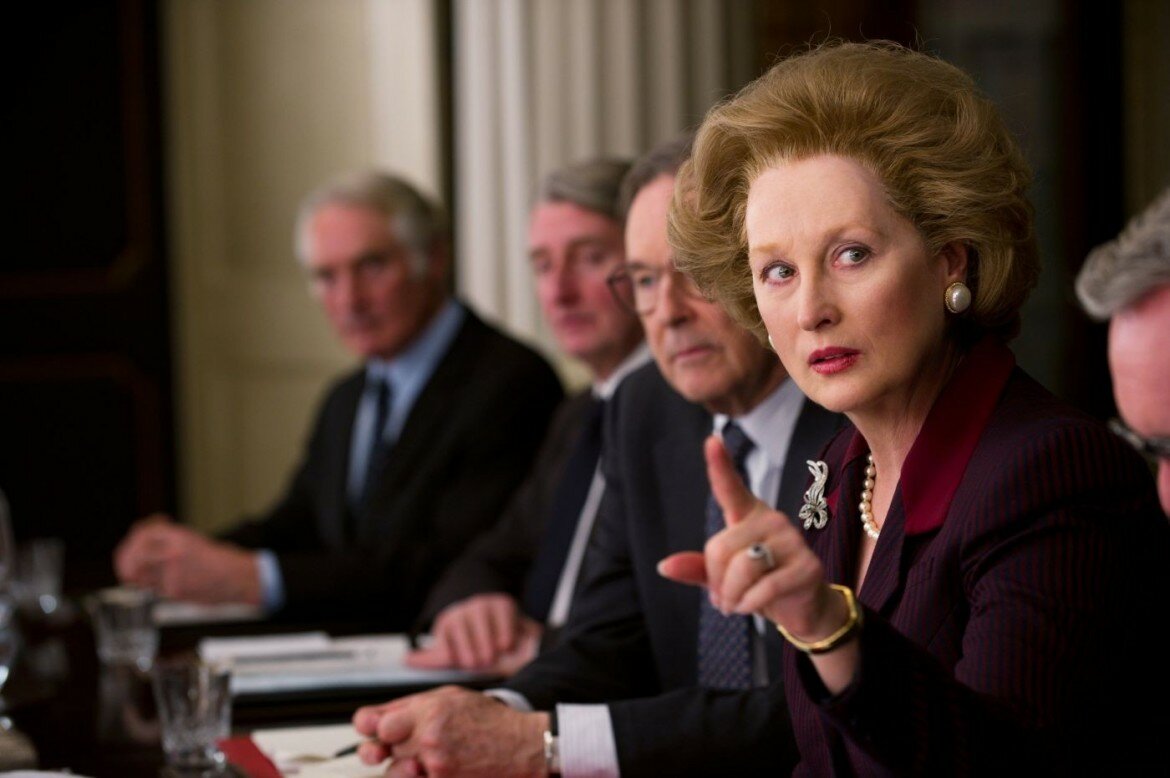On the year anniversary of the death of the UK’s first female Prime minster, a figure of colossal controversial importance in contemporary UK history, this writer takes a look at the biographical account of Margaret Thatcher’s life in the 2011 release; The Iron Lady.
Words: Stewart Thorpe
Director: Phyllida Lloyd
Cast: Meryl Streep, Jim Broadbent, Richard E. Grant, Anthony Head, Alexandra Roach
Certificate: 12
Running time: 105 minutes
Image: 20th Century Fox
The film centres around two characters: Margaret Thatcher, the controversial yet inspirational leader of Great Britain, and Margaret Thatcher, an aged, senile and lonesome lady of past greatness. These characters are explored through a series of flashbacks which highlight the major moments of her career, from the Falklands War to the Miner’s Strikes and the IRA.
From the offset, shown shopping at her local convenience store, its clear present day ‘Maggie’ lingers in the shadow of her previous greatness: shocked at the outrageous price of a pint of milk, the youth’s lack of consideration for the elderly and the bombings broadcast on the front page of a newspaper. It’s almost as if she’s stepping out into society for the first time in a decade.
Upon arriving back at home, Margaret settles around the presence of her husband, Dennis, who curbs her frustration at the price of milk by teasingly suggesting they should sell the car. All seems well until housekeeper, June, enters the room and the audience realise Dennis is in fact dead. Dennis has been dead for years. That Margaret Thatcher suffers from dementia and that her defiant, unaided trip to the shop was perhaps indeed her first in a decade.
Margaret Thatcher is portrayed by two actors, Alexandra Roach who depicts Thatcher during her principal political years and Meryl Streep who does so for the remainder. Roach’s role is largely minimal, allowing Streep to make her mark with her characterisation of Baroness Thatcher which has rightly been recognised across the board as something sensational. The two may have not looked alike but Streep’s performance is utterly convincing. During Thatcher’s prime years, Streep is a battle axe: confident, strong-willed, arrogant and abrasive, whilst during her later years she is patient and multi-layered, immersing into her character at every turning. Back in 2011, her performances won Meryl Streep an Oscar, BAFTA and Golden Globe for Best Actress, widespread recognition for an astounding performance.
At 105 minutes long, The Iron Lady does a good job of including a catalogue of events and issues affecting Thatcher’s life. None, except from the death of her husband Dennis, are allowed much screen time which becomes quite frustrating with some of the meatier issues, but allows the film to cover personal events such as her the influence of her father, the relationship between Margaret and her daughter Carol, Dennis’ wacky eccentricity alongside her professional issues revolving around the events of the day. The combination of these subjects gives the viewer a great insight into the life of Thatcher. Unfortunately the modern-day events prove quite ineffectual as the hallucinations become despondent, bleak and depressing and the series of events is eventually rather anticlimactic. All the same, The Iron Lady proves to be a brilliant peek into Thatcher’s life.
Everyone who lived during her reign as Prime Minster has an opinion on Margaret Thatcher and although the film attempts to provide a neutral perspective, it does shine a positive light on her overall, especially with the inclusion of her later, frail and vulnerable state which humanises a woman often depicted a monster. Although this elderly form is one of weakness, the film stresses Thatcher was a highly motivated lady, a great lady, a fierce lady, an iron lady.





